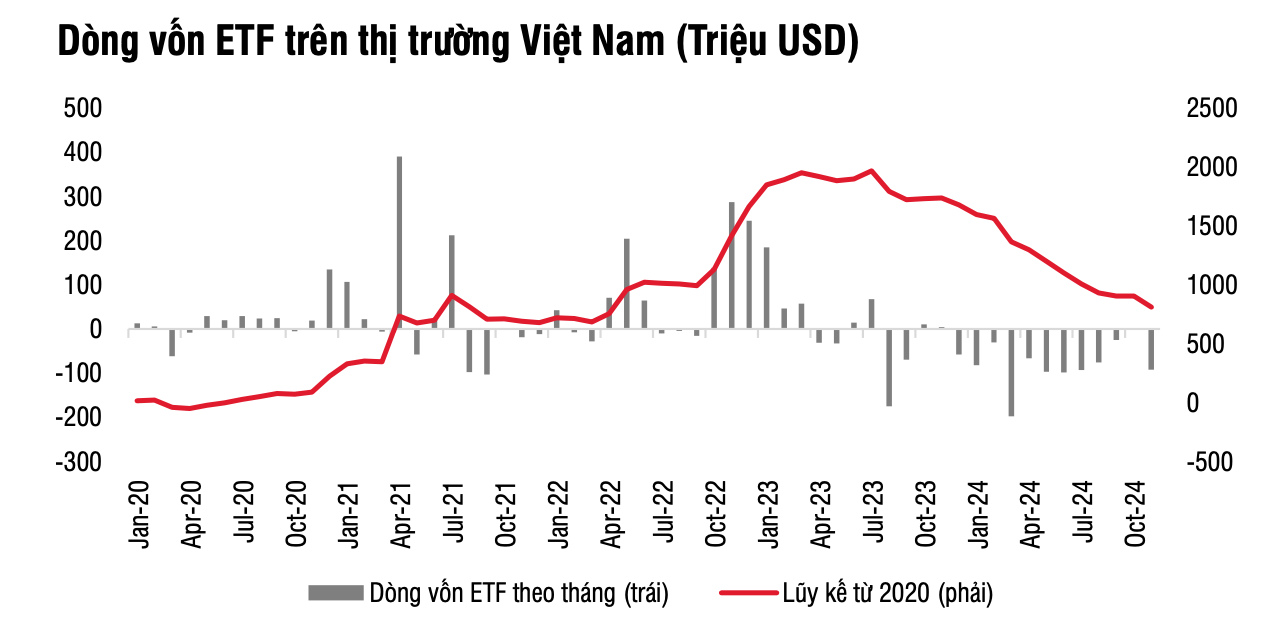SSI's November 2024 global investment capital flow report said that in the Vietnamese stock market, the net withdrawal intensity is getting stronger and stronger in ETF funds.
SSI's November 2024 global investment capital flow report said that in the Vietnamese stock market, the net withdrawal intensity is getting stronger and stronger in ETF funds.
Net withdrawal intensity increases at ETF funds
SSI said that in the Vietnamese market, ETF funds accelerated capital withdrawals in November after two months of slowing down, with a total value of up to VND1.48 trillion, compared to VND700 billion in September and VND300 billion in October. This is the 11th consecutive month of net withdrawals this year, bringing the net withdrawal value from the beginning of the year to -VND22.78 trillion, equivalent to a 30% decrease in total assets by the end of 2023, bringing the total assets of ETF funds to VND56.5 trillion.
Capital withdrawal pressure increased sharply in the group of US and European funds, typically VanEck fund (642 billion) and Xtrackers FTSE Vietnam ETF fund (214 billion), similar to the context of strong cash withdrawal in developing markets. In addition, domestic funds such as DCVFM VN30, DCVFM VNDiamond and MAFM VNDIAMOND ETF also reversed net withdrawals this month with values of 301 billion, 204 billion and 82 billion VND respectively.
On the other hand, Fubon fund traded more actively after 6 consecutive months of strong selling, the net withdrawal value decreased significantly to -28 billion in November. SSIAM VNFIN Lead fund recorded a slight net inflow reversal of 16 billion VND after 8 consecutive months of net withdrawal. KIM Growth VN30 is the only fund that has maintained positive inflow for many months.
More positive signals from Fubon fund - the ETF fund with the largest total assets in the Vietnamese market in the second half of November or the Ministry of Finance is amending Decree 155 with a draft allowing securities companies to register as market makers of ETF certificates to help create liquidity for domestic ETF funds, opening up more opportunities for newly listed ETF funds on the market, SSI assessed.
 |
| Source: SSI |
Meanwhile, in active funds, the trading performance was more differentiated. While active funds investing only in Vietnam narrowed their net withdrawal to only 500 billion, on the contrary, multinational investment funds maintained a strong net withdrawal, about 1.2 trillion VND, bringing the total net withdrawal from active funds in November to 1.7 trillion VND.
Not much expectation on cash flow in December
SSI assessed that transactions from both active funds and ETFs are leaning towards net withdrawals from developing markets and the outlook for December is not too promising as the US market is still attracting most of the attention.
In the global market, the US presidential election results have helped to ease concerns, helping the flow of money into risky assets to break out. The trend of money flowing into global equity funds continued strongly in November, but was mainly concentrated in the US market, while other major markets recorded net withdrawals, except Japan. Net inflows into other financial assets such as bonds and money market funds remained positive in November 2024.
Positive capital flows mainly occurred in developed markets. In November 2024, capital flows into developed market equity funds broke out with a net inflow of 144 billion USD. In total, 11 months saw capital disbursement of 506 billion USD into developed market funds, with the US market continuing to attract cash flows (+143 billion USD and 448 billion USD for 11 months).
The technology group continues to attract the majority of cash flow thanks to the push from individual investors, while investment funds are also more active in disbursing into the US market, with survey results from BofA showing that the allocation ratio to the US stock market has reached its highest level in the past 11 years.
The opposite trend occurred in developing markets as capital flows reversed to net outflows. The strengthening of the US dollar and concerns about tariff policies, the psychological impact of China's economic stimulus package cooled down, causing strong net capital outflows in November, with a value of up to 8 billion USD - the highest net outflow since June 2020. Most markets recorded negative results such as China (-4 billion USD), India (659 million USD).
Source: https://baodautu.vn/cac-quy-etf-tang-rut-rong-tren-thi-truong-chung-khoan-d232027.html


![[Photo] Prime Minister Pham Minh Chinh receives the delegation of the Semiconductor Manufacturing International (SEMI)](https://vphoto.vietnam.vn/thumb/1200x675/vietnam/resource/IMAGE/2025/11/06/1762434628831_dsc-0219-jpg.webp)
![[Photo] Closing of the 14th Conference of the 13th Party Central Committee](https://vphoto.vietnam.vn/thumb/1200x675/vietnam/resource/IMAGE/2025/11/06/1762404919012_a1-bnd-5975-5183-jpg.webp)














































































































Comment (0)